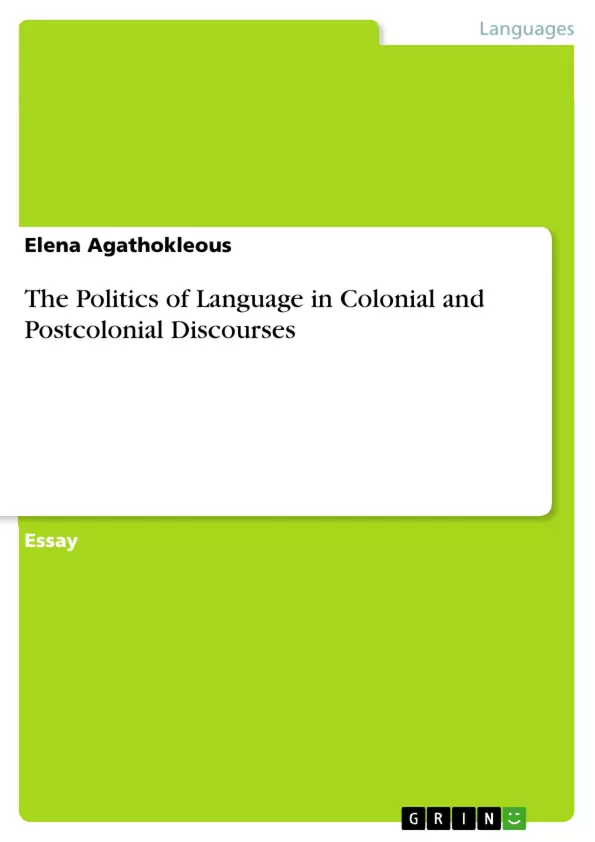In this essay the various ways through which colonials imposed imperial languages are presented followed by examples of how postcolonial responses on the issue of language might have varied but shared the goal of declaring resistance and reclaiming indigenous identities.
In colonial and postcolonial discourse, language has a central role since language has the power to shape people’s perception of the world. Language was used during colonization as a tool which could influence knowledge and understanding in many significant aspects of life such as politics, economics and social environment. However, language has been used by both colonials as a means for establishing their domination but also by post-colonial individuals in order to reclaim their cultural identities after emancipation.
Inhaltsverzeichnis (Table of Contents)
- The Politics of Language in Colonial and Postcolonial Discourses
- Colonial Languages and Cultural Subjugation
- The Spread of Colonial Languages
- Colonial Language Policies and Education
- The Demise of Indigenous Languages
- Postcolonial Responses to Language
- Ngugi wa Thiong'o: Rejecting English and Reclaiming African Identity
- Caribbean Creole: A Language of Resistance and Cultural Identity
Zielsetzung und Themenschwerpunkte (Objectives and Key Themes)
This essay aims to explore the complex relationship between language and power in colonial and postcolonial contexts. It examines how colonial powers used language to establish their dominance, while also showcasing how postcolonial individuals responded to language as a means of reclaiming their cultural identities.
- The power of language in shaping perception and understanding
- Colonial language policies and their impact on indigenous languages
- The use of language as a tool for cultural imperialism
- Postcolonial responses to colonial languages, including rejection and adaptation
- The significance of language in shaping national identity and cultural expression
Zusammenfassung der Kapitel (Chapter Summaries)
The first part of the essay explores how colonial powers used language to establish their dominance. It examines the strategies used to promote colonial languages at the expense of indigenous tongues, including forceful imposition, educational policies, and social pressures. The essay highlights how colonial language policies were designed to marginalize native languages and create a hierarchy of linguistic prestige.
The second part of the essay focuses on postcolonial responses to the legacy of colonial languages. It explores a range of responses, from complete rejection of colonial languages to adaptation and reclamation of native tongues. The essay examines the work of Ngugi wa Thiong'o, who advocated for the exclusive use of African languages in order to combat the lingering effects of imperialism. It also examines the role of Caribbean Creole languages as a means of expressing cultural identity and resistance.
Schlüsselwörter (Keywords)
Key terms and concepts explored in this essay include colonial language policies, cultural imperialism, language and identity, postcolonial responses, language as a tool of domination, and the role of language in shaping national identity. The essay also focuses on the experiences of specific individuals and groups, such as Ngugi wa Thiong'o and Caribbean Creole speakers, to illustrate the complex relationship between language and power.
- Citar trabajo
- Elena Agathokleous (Autor), 2021, The Politics of Language in Colonial and Postcolonial Discourses, Múnich, GRIN Verlag, https://www.grin.com/document/1007713



